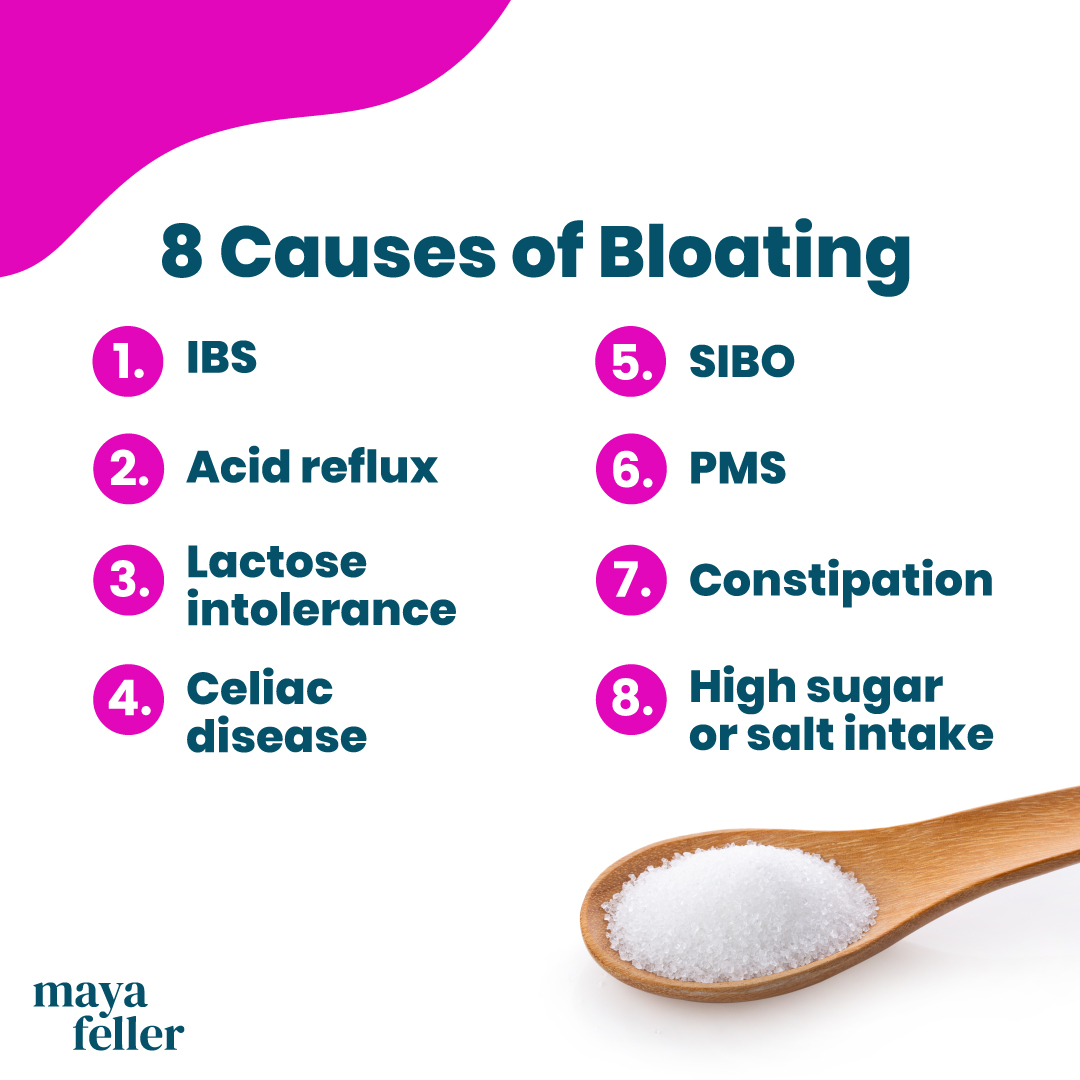Bloated? Here’s Why! [8 Answers for What Causes Bloating + When It’s Serious]
I’ve said it many times: One size does NOT fit all—and belly bloating is a great example of this. So many fad diets are high in fiber and this can actually be the culprit behind the question of what causes bloating.
The truth of the matter is that in order to minimize bloating and get to the heart of what causes bloating for you, you have to really pay attention to what you’re putting into your body and listen to what your body is trying to tell you.
Bloating is the culmination of too much air collecting in your gastrointestinal (GI) tract—often as a result of an inability to effectively digest a certain type of food.
But because the GI system is comprised of many elements and bloating is typically associated with some form of GI issue, there are a number of potential answers to the common question, “Why am I so bloated?”
Let’s take a look at some of what causes bloating to help you determine which of the most common offenders may be contributing to your discomfort.
What Causes Bloating? The Top 8 Offenders
Here are some of the most common answers for what causes bloating and what science has to say about each.
1. Irritable bowel syndrome (IBS)
Bloating is one of the most common unwanted side effects in people with diagnosed IBS, which is why I listed it as number one in this list of what causes bloating.
Interestingly, up to 30 percent of Americans have reported experiencing bloating while at least 90 percent of IBS patients have reported suffering from bloating. [1]
In fact, bloating is the second most common reported IBS symptom, preceded only by abdominal pain. And numerous studies have revealed that at least 75 percent of patients with IBS report regular bloating. [2]
2. Acid reflux
Acid reflux is known to be a common answer to the question of what causes bloating.
Here’s why: Acid reflux promotes more coughing and swallowing, which results in more trapped air and gas accumulation in your stomach.
If you’re looking to decrease bloating due to acid reflux, eating slowly and minimizing your intake of acidic foods is known to help. Also make sure to stay upright for a while after eating and wearing clothing that does not constrict your waist. Lying down too quickly can contribute to the problem.
3. Lactose intolerance
We can’t discuss what causes bloating without addressing the issue of lactose intolerance.
Lactose intolerance occurs when you are deficient in the enzyme required to properly break down the lactose commonly found in dairy products that enter your body.
As outlined in a 2015 scientific article, symptoms of lactose intolerance include bloating, excessive gas and stomachaches, and diarrhea. [3]
The fix to this cause of bloating is to avoid lactose. Fortunately, there are many lactose-free dairy options available as well as dairy milk alternatives, such as nut-based milks, soy milk, oat milk, and more. Try the different kinds and see what works best for you and your preferences.
4. Celiac disease
If you’ve ever felt not quite like yourself after eating gluten, you may want to consider the possibility of celiac disease. It’s actually becoming more common, with 1 in 133 Americans estimated to have the disease that causes an inability to digest gluten.
It’s an autoimmune condition in the small intestine that cannot be cured but may be managed through shifts in nutrition patterns.
Interestingly, it’s estimated that up to 83. percent of those who do have celiac disease are unaware due to a lack of diagnosis or a misdiagnosis. [4]
In addition to causing bloating, celiac disease is known to cause cramping and abdominal pain, gas, and even constipation or diarrhea.
Remember, your body is unique and we each respond to foods in different ways, so it’s important to listen to what your body is telling you after eating different kinds of food. And if you suspect you may have celiac disease discuss your suspicions with your physician to get an accurate diagnosis.
5. SIBO
When you’re considering what causes bloating, it’s important to take SIBO, or small intestinal bacterial overgrowth, into consideration.
SIBO occurs when you experience an excess amount of harmful bacteria in the small intestine. Because your intestines are sensitive to any environmental changes, you experience symptoms rather quickly.
These symptoms include bloating, excess gas and burping, cramping, diarrhea or constipation, and even fatigue—and they’re experienced by approximately two-thirds of people with the condition. [5]
If you suspect you may have SIBO, ask your doctor to run a Lactulose Breath Test, which will provide an accurate assessment of the bacteria in your gut.
You can then work with your doctor to establish the appropriate treatment plan, and work with a Registered Dietitian to create a nutrition plan tailored to you.
6. PMS
It’s estimated that up to 90 percent of women who menstruate experience symptoms of premenstrual syndrome, or PMS. These symptoms include bloating, cramping, backaches, fatigue, and more. [6]
Research has shown that in menstruating women, what causes bloating can be linked to changes in their progesterone and estrogen levels. [7] These changes cause excess water retention, which often results in feeling bloated.
If you’re a menstruating woman who experiences sudden bloating, take a look at where you are in your cycle. And if you suspect your bloated belly is due to PMS, take the following steps to help get some relief:
- Drink more water.
- Limit foods high in sodium.
- Make time for intentional movement and exercise regularly, as perspiring will help to relieve some of that water retention.
7. Constipation
Another common answer to the question of what causes bloating is constipation. How common?
Studies have shown that in the U.S. alone, 16 percent of adults regularly experience symptoms of constipation. Meanwhile, 33 percent of those age 60 and above are affected. [8]
The odds are high that you’ve experienced the symptoms of constipation before: bloating, excess gas, pain, and difficulty producing a bowel movement. But what causes it to begin with?
The truth is that constipation can be due to a variety of issues, including:
- Dehydration.
- Low fiber patterns of eating.
- Hormonal changes.
- Diabetes.
- Thyroid conditions.
- Certain medications.
- Neurological disorders, such as Parkinson’s disease.
Just as with some of the other explanations for what causes bloating, I recommend starting by paying close attention to your body. Consider keeping a journal to track your water and food intake—and see if you can link your constipation to either.
You should also speak with your primary care physician if you experience constipation on a regular basis to see if it’s linked to an underlying condition or medication you may be taking.
Regardless of the cause, there are several solutions so that you don’t have to suffer from the discomfort of constipation and its troublesome symptoms.
8. Excessive sugar or salt consumption
Finally, it’s worth noting that bloating is often caused by excessive consumption of salt and sugar—both of which are incredibly common in the Standard American Diet (adequately referred to as SAD).
In fact, surveys have shown that most Americans exceed the recommended amounts of added sugars, saturated fats, and sodium due to following the SAD.
Unfortunately, the SAD’s grip on Americans is pervasive and seeps into many parts of our daily lives. As a result, over half of all Americans have one or more diet-related chronic illnesses, such as cardiovascular disease, some cancers, diabetes, and high blood pressure.
So, what can you do if you suspect that eating too much salt and/or sugar is the answer to what causes bloating in your situation?
Consider your lifestyle and how you can make simple adjustments to cut back on added sugar and sodium. One piece of advice I recommend to my patients is to ask yourself the following question each and every day: How does this serve me, my health and our planet?
Often, the answer will help guide you to make the best decisions for your health.

When to See a Doctor About Bloating
If you experience chronic or serious bloating, it’s in your best interest to reach out to your healthcare provider or a consult. While less common, there are more serious issues that can be at the root of what causes bloating that should be ruled out if you experience bloating on a regular basis.
These include ulcerative colitis or Crohn’s disease, ovarian cancer, parasite infections, and more.
Fortunately, most cases of bloating can be traced back to the more common causes listed above. Just remember to listen to your body. For additional tips on how to adjust your food intake to reduce bloating, check out my segment on Beating Belly Bloat.


Leave a Reply